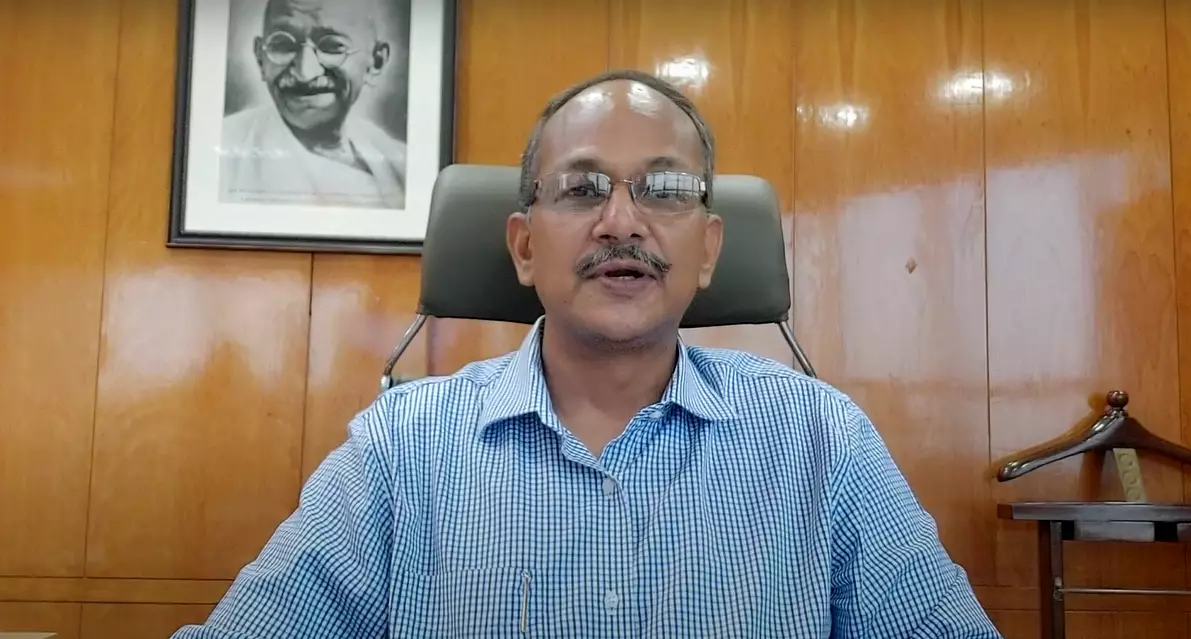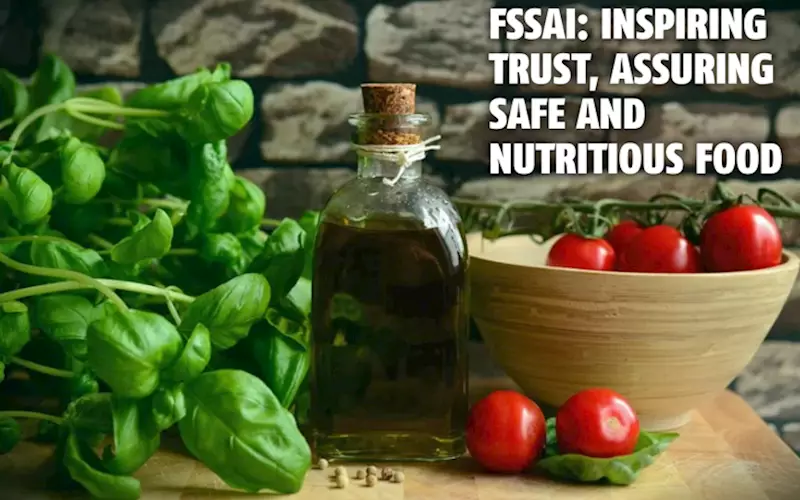FSSAI: Inspiring trust, assuring safe and nutritious food - The Noel D'Cunha Sunday Column
The Federation of Indian Chambers of Commerce and Industry (FICCI) hosted its India Food and Nutrition Innovation Summit 2021 (IFNIS 2021) from 27-28 October 2021. The aim of the summit, which saw more than 3,000 registrations, was to strengthen the ecosystem and promote the culture of safe food among all stakeholders.
Arun Singhal, CEO, FSSAI spoke about undernourishment and the importance of finding a solution. He said, "We have to think of innovative ways to solve our under-nourishment as well as over-nourishment too."
Read on....
31 Oct 2021 | By Noel D'Cunha
Arun Singhal, who took over as chief executive officer of the Food Safety and Standards Authority of India (FSSAI), country's India's apex food regulator in June, spoke about how to strengthen the food safety infrastructure in India. As he said, "how to provide a science-based standard; and ensure these standards are met."
An MTech from IIT Kanpur and an IAS officer of the 1987 batch, Singhal was special secretary, department of health and family welfare, before he was appointed the head of the body tasked with setting up standards for the food industry and regulate the manufacturing, storage, distribution, sale, and import of foods.
Singhal said that the regulator is planning to develop a risk management system for the domestic sector similar to the system already in place for imported products for sampling and inspection. This will include the product details, manufacturer profile, compliance reports to reduce the incidence of unnecessary inspection by food and safety inspectors.
Singhal added that one of the biggest innovations by FSSAI was the launch of the 'Eat Right India' campaign through which consumers would get all information regarding healthy food. This was launched by FSSAI to protect the health of the people in India by transforming the food ecosystem of the country. It is based on three key themes- Eat Safe, Eat Healthy, and Eat Sustainable.
Singhal said, "From next January, consumers while visiting the restaurant, will find the menu card to have the serving size along with the calorific information of the serving as well. We are soon coming out with the Vegan logo. There is a small class of people growing in numbers who are vegans and there was no certification available for vegan foods. We have also come out with regulation for Ayush aahaar as well."

Arun Singhal, Food Safety and Standards Authority of India (FSSAI)
Ensuring food is safe
In order to ensure food safety for people, FSSAI has initiated Food Safety Training and Certification (FoSTaC) – a unique program to ensure a trained and certified Food Safety Supervisor (FSS) on each food business premise.
Singhal highlighted that FSSAI has been focusing on rapid food testing kits. He said, "We are among the very few countries in the world to start the concept of mobile food testing labs and we have the concept of Food Safety on Wheels."
Singhal emphasised on the innovation and opportunities in the sector and said that the scope for industry is humungous including the innovations in primary production and post-harvest management. "There could be innovations in food waste management, food packaging technology and packaged food with lower carbon footprint, for example, alternate proteins.
He stressed the importance of "blockchains, IoT, real time monitoring, end-to-end traceability technologies."
He urged the industry to set apart some budget for research and development. "Our aim is to ensure safe, healthy and sustainable food for all Indians and to make that a reality we need to foster a culture of innovation. This is something the government alone cannot achieve on its own and requires the partnership of government, industry and innovators."

Creating a buzz for healthy food
Singhal spoke about the focus on millets (bajra). Here he mentioned the success of FSSAI's contest for recipes (Recipe Ravivar) that was introduced. Singhal said, "Under this scheme, we would mention one vegetable every month and ask people to give us recipes based on that vegetable. Then the best recipes were chosen." This year the theme is millet. And the people have to prepare a recipe based on millet. The best recipes will be published in a book. The reason for this millet-drive is, "there are many people who want to use millet in their food palate but they are not able to do so." Singhal felt this is one simple way that the industry can "innovate".
He cautioned the delegates at the FICCI Summit that "It is a rapidly changing world. And no industry can't survive without innovation. Food systems are evolving. Food products are being reformulated. Food chains are becoming increasingly technology driven along with new innovative approaches. What India needs is new-age disruptive technologies for food products plus scientific advances."
FSSAI is a regulator and Singhal said its job is "to provide safe and wholesome food and come out with science-based standards and enforcement of those standards." He mentioned FSSAI has been embracing the use of technology in almost all "our activities".
Singhal said, "We have gone for ease of doing business forms on all our platforms. We are coming out with the concept of a perpetual license so that there is no need for regular renewal for any industry."
Singhal said, as a regulator, FSSAI has not only to come up with standards "FSSAI has to enforce them". But he said, for this mechanism to succeed the public and the consumers should be aware. He said, "In a democracy, people get what they want. If they want good teaching in a school then the schools will deliver. If they want ration, then they will get it. Likewise if they want the food system to deliver, then they will get healthy food." He said, if there is a people's movement, the industry and executive and bureaucracy will have to respond and deliver.
But Singhal mentioned that for this to transpire in India, "educating the people and creating a buzz for healthy food is critical." Therefore even though FSSAI is a regulator, the agency has initiated a huge campaign – Eat right India – to educate the masses, under the three pillars of eating safe, eating healthy and eating sustainability. "FSSAI formulated a vision based on these pillars on the food Indian will be eating in 2050," said Singhal.
Singhal also informed of the developments on the new front of pack labeling (FOPL) regulation, where FSSAI decided to drop transfats, replace salt with sodium, include total sugar, saturated fats and information on positive nutrients. "IIM Ahmedabad has been tasked to survey the consumers, around 20,000 of them, and find out what they think is the best pictorial form of labeling information including thresholds," said Singhal on the FOPL regulation. The report is awaited.

Also, on the anvil are network of professionals in food and nutrition, a risk management system as far as imports are concerned. Last year about two-lakh consignments came into the country of which 20% were referred to FSSAI for sampling and testing. "Unfortunately, there's nothing on the domestic side, as the food inspector does not have inputs on what is to be inspected, hence we are developing a risk management system for the domestic markets too."
FSSAI is implementing a Central Sector Scheme for "Strengthening of Food Testing Ecosystem in the Country with a total outlay of Rs. 481.95 Cr that includes Rs 300 Cr for strengthening the network of laboratories across the country as well as provision of Mobile Food Testing Labs and other related equipment. Under this scheme, 39 State Food Testing labs of 29 States/UTs and 10 referral labs have been taken up for upgradation with high end equipment to enable testing of safety parameters viz. heavy metals, pesticides and antibiotics. Till date, 60 Mobile Food labs have been provided to 32 States/UTs for testing, training and awareness generation even in remote areas. During COVID-19 pandemic, a total of 179 online training programs have been conducted with 37,000 participants.
FSSAI has launched its cloud-based, upgraded new food safety compliance online platform called Food Safety Compliance System (FoSCoS). It will replace the existing FLRS. FoSCoS is conceptualised to provide one point stop for all engagement of an FBO with the department for any regulatory compliance transaction. FoSCoS has been integrated with FoSCoRIS mobile app and will soon integrate with present IT platforms of FSSAI such as INFOLNet, FoSTaC, FICS, FPVIS etc. Audit management system and other activities/ modules will be enabled in a phased manner in future. It has been launched and rolled out in nine States/UTs viz. Tamil Nadu, Gujarat, Goa, Delhi, Odisha, Manipur, Chandigarh, Ladakh and Puducherry w.e.f 1 June 2020 and will be rolled out in the entire country in a gradual manner.
FSSAI has signed a MoU with the Ministry of Food Processing Industries to support micro food entrepreneurs, farmer producer organisations (FPOs), self help groups (SHGs) and producers cooperatives to improve the standard of food businesses. Food handlers of micro level food processing units will be provided training on understanding of good hygiene and manufacturing practices, food testing processes, and other regulatory requirements. On successful completion of training, food handlers will be provided a certificate by FSSAI.











 See All
See All